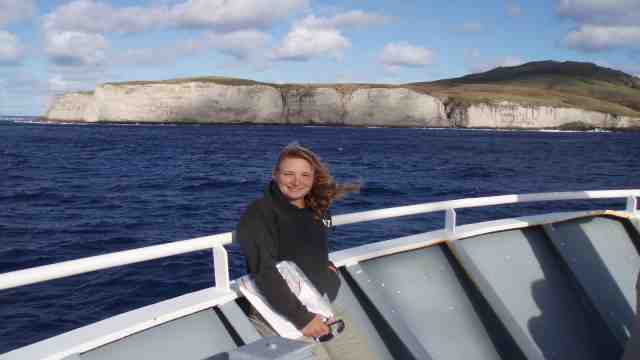Award for research on underwater volcanic activity
Dr Melissa Rotella has been recognised for her eye-opening discovery of the activity of underwater volcanoes.

Dr Melissa Rotella, based in the School of Geography, Environment and Earth Sciences, has been awarded the annual Royal Society of New Zealand Hatherton Award for published research, which led to a new type of underwater volcanic eruption being discovered.
Dr Rotella is the first geologist to receive the prize in its 17-year history.
She looked at underwater explosive volcanoes in the Kermadec Islands, north of New Zealand, as part of her PhD research.
“We know quite a lot about on-land volcanoes but the underwater realm is largely unexplored,” she explains.
In 2007, Dr Rotella was part of a team of researchers that went to sea to look at deposits from four volcanoes, including the mostly underwater Macauley volcano. They dredged pumice from the sea floor and compared it with pumice which had been deposited on Macauley Island.
“Right away we noticed that the dredged pumices were different,” she says. “We knew that something quite different was happening under the water compared with the big explosive eruptions above ground.”
Melissa says that, unlike an on-land volcano, which either explodes or generates lava flows, the volcanic material from underwater had erupted as a buoyant foam. “Instead of rocketing through the water, it lobs off and floats upwards. The outside of it chills, but the inside continues to bubble. This couldn't happen out of the water as it wouldn't have the buoyancy.”
The research team has coined this type of underwater volcanic eruption Tangaroan, taken from the name of the boat they were sailing on, the Tangaroa, which is NIWA’s deep-water research vessel and has the same name as the Māori god of the sea.
Professor Colin Wilson, who supervised Melissa’s research, says the study has opened up new perspectives on underwater volcanoes.
“Until now, the thinking has been that underwater volcanoes behave in exactly the same way as their above ground equivalents,” he says. “This research demonstrates that the presence of the water allows magma to float away from the vent, regardless of whether on dry land it would explode or flow as lava.”
Dr Rotella analysed the pumice using the electron microprobe facility housed in the School of Geography, Environment and Earth Sciences.
“All of the analytical work was done here at Victoria University. It isn't common to have all of the equipment on-site, we are very fortunate to have it,” she says.
The Hatherton Award is presented for the best scientific paper by a PhD student at a New Zealand university published during, or within two years, of the completion of their doctorate.
Dr Rotella was the lead author on a paper on underwater volcanoes, based on her PhD research, which was published earlier this year in Nature Geoscience. Her work was part of a Marsden funded project led by Professor Colin Wilson and Professor Ian Wright, then of NIWA and now at the National Oceanography Centre at Southampton in the United Kingdom.
“I was honoured to win the prize and to represent the School,” says Melissa. “It is not only for me, but for the whole team involved.”
